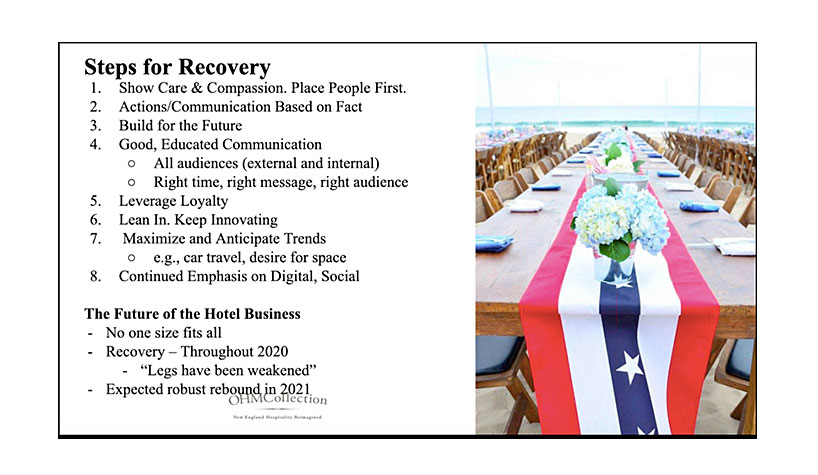NATIONAL REPORT—Responding to the COVID-19 pandemic in the right way is key for the hospitality industry to thrive. In “Sojern’s COVID-19 Webinar Series #3: How Hoteliers are Responding,” industry experts offered advice and illustrations of ways to respond to the crisis.
Laurie Hobbs, director of marketing and public relations, Ocean House Management, discussed how the Rhode Island-based company is handling the situation and planning for the future.
“What we are doing at Ocean House Management Collection is communicating to all of our audiences, internal and external,” she said. “We are doing that through social, through email, through digital resources like Sojern, and also publicity. We don’t want to overcommunicate, but we are communicating in a very honest, open and deliberate fashion.”
That communication is “Crisis Communications 101,” she said. “We are showing care and compassion. We are trying to place people first, both internally and externally. Our actions and communications are based on fact.”
The company is also remaining engaged in the community by having its food truck feed those in need, and offered free meals on Easter.
Hobbs also said that it is important to leverage the loyalty of regular guests when it comes to building for the time after the recovery. “[This is] something I have learned from the past in crisis situations,” she said. “Those people who are loyal to you in any hotel setting are usually going to be the first to respond. We are tapping that loyalty in our properties as well.”
Also important in the recovery is anticipating trends. “Here in the U.S., specifically in the Northeast, we anticipate that there is going to be a high demand for car travel, a desire for space in people’s dining and events, and also accommodations, so we are going to try to leverage those trends,” she said. “We do think there is going to be continued emphasis on digital and social.”
Cady Wolf, VP of global commercial strategy, Sojern, agrees that the drive market will be a very important factor in the recovery. “People just want to get in their own car, go somewhere, have their own scenery and feel safe about it,” she said.
Wolf said that she has started seeing some destinations already begin their marketing campaigns. “[They are] looking for things to pick up mid-May and June, which is great,” she said. “We still have a lot of hotel partners on the website as well. The messaging is more around demonstrating hope, security and safety: ‘We are going to be here for you when you are ready to come back.’”
Hobbs thinks that expressing that security and safety is important going forward because that is what guests will be looking for. “We had a staff meeting and we were talking about how the rules of engagement may change a little bit,” she said. “Is it going to be that restaurants are going to be a little more spaced out? Is it a case where there will be some added amenities that are needed in terms of extra sanitation, or the communication of those messages? The extra steps [are needed] because people are going to be a little more cautious as they come back and travel.”
She added, “I think the legs of the hospitality industry have been weakened and we need to strengthen our legs again, and strengthen the legs of that consumer confidence. As we all have seen, we expect there will be a robust rebound in 2021. We are following that line of thinking as we move forward, but we are very bullish. We are going to continue to work with government officials, we are going to open when we can, and we are going to provide the best consumer experience possible.”
